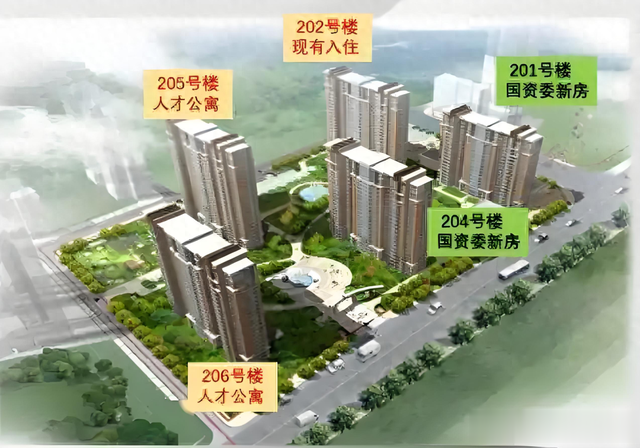

朝阳区国资委近期以7折价格集中抛售晨光家园C区300套次新房,单价低至5万元/平方米,较市场价下跌15%-30%。这批房源位于东四环十里堡地铁站600米范围内,虽是2012年建成的毛坯房,但因长期空置且户型设计落后,实际竞争力有限。此次抛售是国资两年内第三次大规模“割肉”,直接冲击朝阳区二手房价格体系。
The Beijing Chaoyang District State-owned Assets Supervision and Administration Commission recently sold 300 nearly-new homes in Chenguang Jiayuan Area C at a 30% discount, with prices as low as 50,000 yuan per square meter. Located just 600 meters from Shilipu subway station, these homes, built in 2012, remain vacant and feature outdated layouts. This marks the third large-scale discount sale by state-owned entities in two years, further destabilizing the secondary housing market.
抛售房源中,94平方米两居室单价仅5万多元,较4月同户型成交价6.7万元降幅超25%。大户型价格甚至下探至5.5万元,总价直降百万。然而,这些房屋存在明显缺陷:95平方米仅能做两居,得房率不足70%,且东侧临近铁路,存在噪音问题。功能性短板成为低价的主因,也反映出早期住宅产品与当前需求的脱节。
Among the discounted units, a 94㎡ two-bedroom apartment was priced at just over 50,000 yuan/㎡, 25% lower than its April transaction price. Larger units saw prices drop to 55,000 yuan/㎡, slashing total costs by one million yuan. However, these homes suffer from functional flaws: a 95㎡ unit can only fit two bedrooms, with a 70% effective area ratio and railway noise pollution. Such drawbacks highlight the mismatch between older designs and modern needs.
市场迅速反应:晨光家园周边二手房挂牌量单日翻倍,业主恐慌性抛售加剧。6月朝阳区二手房挂牌均价同比下跌8.1%,新增挂牌量占全市25%。与新北苑此前经历类似,国资低价出货引发连锁反应,形成“抛售-降价-更多抛售”的恶性循环。中介透露,朝青板块部分房源成交价已跌破6万元,较年初下降15%。
The market reacted swiftly: listings near Chenguang Jiayuan doubled in a single day as panic selling spread. In June, Chaoyang’s secondary home prices fell 8.1% year-on-year, with new listings accounting for 25% of Beijing’s total. Mirroring the Xinbeiyuan precedent, state-owned discounts triggered a vicious cycle of price collapses. Some homes in Chaoqing now sell below 60,000 yuan/㎡, down 15% from early 2025.
新房市场的挤压同样严峻。朝阳区当前库存达131.6万平方米,未来三年还将新增340万平方米住宅用地。保利朝观天珺等新盘得房率超90%,进一步凸显国资抛售房源的产品劣势。分析指出,国资选择市场低谷期集中出货,既错失2022年高位套现机会,又加剧了楼市下行压力,被质疑缺乏政策协调性。
The new-home market adds pressure: Chaoyang’s current inventory of 1.32 million square meters will expand by 3.4 million square meters in three years. Projects like Poly’s Chaoguan Tianjun, with 90%+ effective area ratios, outclass the state-discounted units. Critics argue that selling during a slump—missing the 2022 peak—worsens market instability and reflects poor policy alignment.
购房者面临两难选择。低价提供了东四环上车的机遇,500万总价即可购入次新小区。但户型缺陷、装修成本和升值潜力弱于商品房等风险不容忽视。尤其对比同地段中海萬吉玖序等豪宅(单价11.3万元),国资房源的投资价值明显逊色。市场分化加剧:劣质资产贬值,优质资产仍受追捧。
Buyers face dilemmas: discounts enable entry into East Fourth Ring Road for 5 million yuan, but risks include poor layouts, renovation costs, and lower appreciation potential. Compared to luxury projects like China Overseas’ Wanjijiuxu (113,000 yuan/㎡), state-owned units underperform. The market increasingly polarizes: low-quality assets depreciate while premium properties hold value.
更深层矛盾在于国资处置资产的时机与方式。业内人士质疑,集中抛售违背“稳预期”政策导向,反而制造局部踩踏。财政部2022年要求盘活国有资产,但朝阳区国资委的操作被指“被动变现”,未能平衡资产保值与市场稳定。这种矛盾折射出楼市调控中政府角色与市场规律的博弈。
The core conflict lies in the timing and method of state-owned asset sales. Concentrated discounts contradict "market stability" policies, creating localized crashes. While the 2022 fiscal policy urged asset revitalization, Chaoyang’s approach appears reactive, failing to balance value preservation and stability. This reflects the tension between government intervention and market forces.
历史经验显示,国资抛售往往加速区域房价调整。2023年北京住建委抛售154套房源后,新北苑房价下跌30%。当前晨光家园的抛售可能重演这一剧本,尤其叠加新房供应过剩因素。朝阳区已成为北京楼市风险集中地,国资、开发商、业主三方博弈加剧市场不确定性。
Historically, state-owned sales accelerate local price corrections. After Beijing’s 2023 sale of 154 homes, Xinbeiyuan prices dropped 30%. Chenguang Jiayuan’s sale may repeat this pattern, especially with excess new-home supply. Chaoyang has become Beijing’s real estate risk epicenter, with state entities, developers, and homeowners fueling volatility.
政策制定者面临两难。一方面需消化库存,另一方面要防范系统性风险。朝阳区案例暴露了国有资产管理与楼市调控的协调缺失。专家建议建立更灵活的资产处置机制,例如分批出让或转为保障房,避免对市场造成瞬时冲击。
Policymakers grapple with dual tasks: reducing inventory while preventing systemic risks. Chaoyang’s case reveals poor coordination between state asset management and market regulation. Experts suggest phased sales or converting units into subsidized housing to mitigate shocks.
长远来看,此次事件或推动北京楼市价值重估。功能性差的房产将持续贬值,而核心区优质资产仍具韧性。对刚需群体而言,国资抛售提供了罕见的“捡漏”窗口,但需理性权衡短期优惠与长期持有成本。市场正从投机炒作转向居住属性主导的时代。
Long-term, this incident may accelerate value reassessment in Beijing: obsolete homes will depreciate, while core-area assets endure. For rigid demand, state discounts offer rare bargains—but require weighing short-term savings against long-term costs. The market is shifting from speculation to living-centric dynamics.
最终,朝阳区的抛售潮不仅是经济行为,更是对政策智慧的考验。在房地产新旧周期交替之际,如何平衡国资退出、市场稳定与居民住房需求,将成为决策者必须解答的命题。这场冲击或许只是北京楼市深度调整的开始。
Ultimately, Chaoyang’s sell-off tests policy wisdom beyond economics. As the property market transitions, balancing state exits, stability, and housing needs will define governance. This shock may mark just the beginning of Beijing’s profound correction.
配资加杠杆,2023十大正规配资平台,哪个平台可以买股票提示:文章来自网络,不代表本站观点。







